| |
 |
| Newsletter of the International Institute for Energy Conservation (IIEC) |
May 2014 |
|
| |
| |
|
IIEC Project News |
|
Delivering Annual Energy Savings of 1.75 million USD in the Pacific
 The Promoting Energy Efficiency in the Pacific – Phase 2 (PEEP2) Project is a supporting technical assistance project (TA-7798-REG) funded by the Asian Development Bank (ADB) and the International Institute for Energy Conservation (IIEC) is the technical assistance consultant selected for project implementation. The main objective of the PEEP2 is to identify, design and implement energy efficiency measures that deliver significant energy savings, lower greenhouse gas (GHG) emissions and reduce dependency on fossil fuels for electricity generation.
The Promoting Energy Efficiency in the Pacific – Phase 2 (PEEP2) Project is a supporting technical assistance project (TA-7798-REG) funded by the Asian Development Bank (ADB) and the International Institute for Energy Conservation (IIEC) is the technical assistance consultant selected for project implementation. The main objective of the PEEP2 is to identify, design and implement energy efficiency measures that deliver significant energy savings, lower greenhouse gas (GHG) emissions and reduce dependency on fossil fuels for electricity generation. |
| As of December 2013, a total of 31 energy efficiency projects were designed and approved by the ADB for funding or co-financing by the ADB, Global Environment Facility, the Government of Australia and the Government of Japan. An additional three projects are being considered for Papua New Guinea. The projects cover energy efficiency measures in the residential, commercial and public sectors (including street lighting). |
| Overall, the total projected annual energy savings are 3.49 GWh per year, and annual energy cost savings of 1.75 million USD per year and total annual CO2 savings of 2,818 tons of CO2 equivalent per year. The Table below provides a summary of the estimated annual savings per country. The projects covering energy efficient lighting in the residential, commercial and government sectors represent about 70% of the total estimated annual energy savings. |
The IIEC has commenced delivery and installation of energy efficient equipment in each of the five countries, which will continue during 2014. The estimated savings mentioned above will be monitored and verified for each project during 2014 and project case studies will be published during the second half of 2014.
|
Summary of Projected Annual Savings for PEEP2 Energy Efficiency Projects according to Country
| Country |
Annual Energy Savings
(kWh/Year) |
Annual Energy Cost Savings
(USD/Year) |
Annual CO2
Savings
(tons of CO2e/Year) |
| Cook Islands |
836,271 |
485,477 |
629.5 |
| Papua New Guinea |
262,405 |
133,144 |
165.9 |
| Samoa |
740,569 |
333,257 |
601.4 |
| Tonga |
638,924 |
250,977 |
581.7 |
| Vanuatu |
1,007,048 |
550,548 |
838.8 |
| TOTAL |
3,485,217 |
1,753,403 |
2,818.3 |
|
|
|
|
|
|
The Philippine Department of Energy Acknowledges IIEC’s Achievements on the Philippines Energy Efficiency Project
|
 IIEC recently completed the Philippines Energy Efficiency Project (PEEP) for the Philippine Department of Energy (DOE) - 46.5 million USD project, co-financed by the Government of the Philippines and a loan from the ADB. By the second year of the PEEP’s three-year project period, IIEC and the DOE had already surpassed initial goals, reducing power loads by 242 MW and achieving annual energy savings of 315 GWh. These savings stood over and against the projected 238 MW in power capacity reduction and 313 GWh in annual energy savings. IIEC recently completed the Philippines Energy Efficiency Project (PEEP) for the Philippine Department of Energy (DOE) - 46.5 million USD project, co-financed by the Government of the Philippines and a loan from the ADB. By the second year of the PEEP’s three-year project period, IIEC and the DOE had already surpassed initial goals, reducing power loads by 242 MW and achieving annual energy savings of 315 GWh. These savings stood over and against the projected 238 MW in power capacity reduction and 313 GWh in annual energy savings. |
|
|
The PEEP targeted energy efficiency through national lighting, building retrofits and other DSM methods across sectors. The project generated a network of activities and knowledge-sharing platforms that produced both immediate and ongoing energy savings across the nation. IIEC engaged government and business leaders as well as stakeholders in the residential sectors in order to understand and address key sources of energy inefficiency. |
| Among the PEEP’s landmark activities were the nation-wide distribution of 8.6 million compact fluorescent lamps (CFLs), retrofitting projects in 150 government buildings, and changes to municipal services such as park lighting and chemical waste management facilities. The project’s completion marked a national milestone towards higher efficiency, lower emissions, and strengthened capacity across all major energy producing and consuming sectors. |
| By the project’s completion in December 2013, results had long since surpassed initial projections. The PEEP achieved a total CO2 reduction of 173,745 tonnes, power capacity reduction of 242 MW, and 322 GWh of annual energy savings. Satisfaction with these results prompted a formal letter of satisfaction from the DOE, commending IIEC for its “professionalism and dedication” to the program’s goals. |
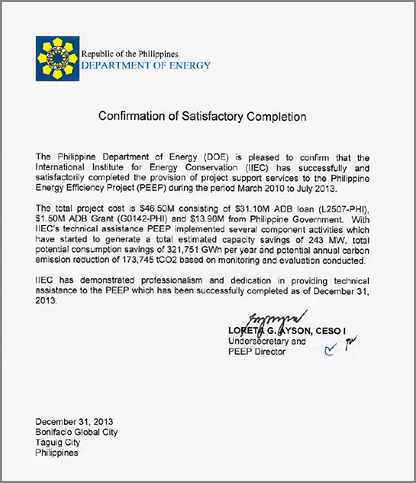
 Letter of Satisfaction from DOE Letter of Satisfaction from DOE |
| For further information, please contact Angelica Dealino - adealino@iiec.org |
Back to Top  |
|
|
|
|
|
World Bank Awards IIEC with Energy Efficient Urban Street Lighting Implementation and Financing Solutions Project in India
 IIEC is working with The World Bank and Energy Efficiency Services Limited (EESL) in India to develop an Energy Efficient Street Lighting Guidance - Financing and Implementation Manual. The aim of this project is to support the preparation and implementation of energy efficient street lighting projects in India and elsewhere, using performance contracting and other Public Private Partnership (PPP)-based delivery approaches. This project is a crucial part of an ongoing World Bank-sponsored project on Energy Efficient Urban Street Lighting (under the India Urban Cluster AAA Program) being implemented in collaboration with EESL.
IIEC is working with The World Bank and Energy Efficiency Services Limited (EESL) in India to develop an Energy Efficient Street Lighting Guidance - Financing and Implementation Manual. The aim of this project is to support the preparation and implementation of energy efficient street lighting projects in India and elsewhere, using performance contracting and other Public Private Partnership (PPP)-based delivery approaches. This project is a crucial part of an ongoing World Bank-sponsored project on Energy Efficient Urban Street Lighting (under the India Urban Cluster AAA Program) being implemented in collaboration with EESL. |
|
The project is part of an effort to streamline and mainstream the Energy Efficient street lighting process for Urban Local Bodies (ULBs) in India. IIEC will prepare the manual and will draw upon global best practices, including practices that have been tried and proposed within India and South Asia – drawing from their failures and successes to document the major lessons learned. The activity will result in an operational toolkit which will be useful for assessing options and developing practical solutions for scaling up the implementation of large street lighting programs in cities and municipalities. |
|
The Implementation Manual is expected to be a valuable and practical resource that will support industry players (such as equipment suppliers and energy service providers) and government authorities to implement energy efficiency projects in urban street lighting. |
| For further information, please contact Sanjay Dube - sdube@iiec.org |
Back to Top  |
|
|
|
|
|
Briefing on Implementation of DSM/EE Project in Lao PDR
 Through cooperation with the Electricite du Laos (EdL), IIEC is supporting the design and implementation of the ongoing Demand-Side Management and Energy Efficiency Phase 2 (DSM/EE II) Project, funded by the World Bank, to ensure sustainable energy development in Lao PDR.
Through cooperation with the Electricite du Laos (EdL), IIEC is supporting the design and implementation of the ongoing Demand-Side Management and Energy Efficiency Phase 2 (DSM/EE II) Project, funded by the World Bank, to ensure sustainable energy development in Lao PDR. |
|
In Phase II, EdL is currently addressing the residential and small business sectors through the Compact Fluorescent Lamp (CFL) Exchange Program, which is expected to save around 18 gigawatt hours (GWh) over the next year. To raise nationwide awareness of the benefits of energy efficient lighting and household appliances, EdL has launched a campaign on television and radio including travelling roadshows in the Southern and Northern provinces to educate the general public. In the public sector, EdL is working to procure high efficiency lighting and air-conditioning system technologies needed to deliver energy savings changes in Lao's public buildings. In the residential sector, IIEC is supporting the setup of a sub-committee designated to establish the policy framework for the development and adoption of energy efficiency standards and labels for household appliances. In addition to capacity building of EdL’s DSM/EE team, an intensive training course covering energy technologies, energy auditing and Monitoring and Verification (M&V) of Energy Efficiency measures has been conducted. |
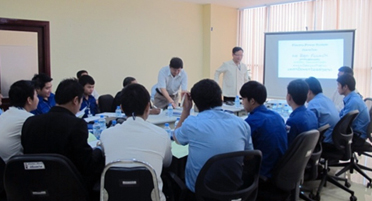
 Capacity Building Training Course Conducted in March 2014 Capacity Building Training Course Conducted in March 2014
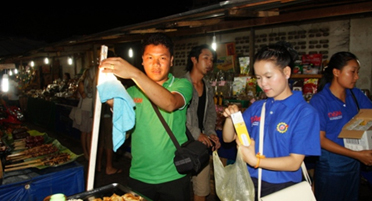
 Sharing Information with a Local Community on Energy Efficient Light Bulbs in Luang Prabang Sharing Information with a Local Community on Energy Efficient Light Bulbs in Luang Prabang |
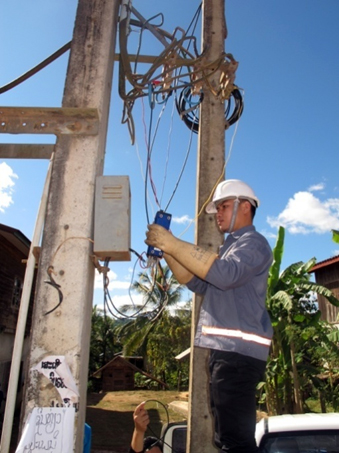
 DSM/EE Team’s Energy Monitoring at DSM/EE Team’s Energy Monitoring at
Feeder Level |
|
|
|
|
| |
|
IIEC Staff News |
|
Nitin Pandit Completes 13 Year Term as IIEC President
|
 Dr. Nitin Pandit has left IIEC after serving for 13 years as President. He has joined the World Resources Institute (WRI) to continue his career in sustainable development. Dr. Nitin Pandit has left IIEC after serving for 13 years as President. He has joined the World Resources Institute (WRI) to continue his career in sustainable development.
Joining IIEC in May 2000, Dr. Pandit developed many programs and policy implementation initiatives during his tenure to demonstrate how EE could be delivered in the most cost effective manner in developing and emerging countries. He and his Institute colleagues facilitated the development and testing of a variety of innovative mechanisms, particularly in key Asian counties such as Thailand and India, including EE building codes and eco-housing, as well as appliance S&L. Other areas that Dr. Pandit and IIEC focused on included end use water pumping interventions for energy efficiency improvement in housing, hybrid solar thermal systems, climate performance assessment of credit lines for small and medium enterprises, and methodologies to better understand the rural water-energy-biomass nexus.
|
 |
|
|
Through Dr. Pandit’s leadership IIEC has emphasized the use of innovative financing in order to accelerate the implementation of EE. IIEC’s path breaking work was recognized with an award from the World Bank’s Development Marketplace, and also jointly by the World Bank, L’Agence Française de Développément, and the Gates Foundation. |
|
With Nitin’s departure, IIEC’s Board of Directors appointed Mr. Felix Gooneratne to become IIEC’s CEO. He has assumed the overall management responsibility for IIEC’s operations worldwide, having served IIEC since 2001, as the Asia Director based in Bangkok, with responsibility for the management of IIEC offices in India, Philippines and Thailand. |
|
In his departing statement, Dr. Pandit wished the IIEC Board, staff, and partners well, and urged IIEC to continue its important work in bringing about critical EE solutions to meet the considerable dangers of climate change. |
|
IIEC’s Board and its colleagues thank Nitin for his work with IIEC and hope that he will enjoy success in his new position with the WRI. |
|
Back to Top 
|
|
|
|
|
|
|
|
IIEC Welcomes New Staff to India and Thailand Offices
 We are pleased to announce the hiring of following key staff at IIEC's New Delhi and Bangkok offices: We are pleased to announce the hiring of following key staff at IIEC's New Delhi and Bangkok offices: |
|
Prima Madan was engaged as IIEC’s Senior Project Manager, and will be based in our New Delhi office. Since earning her Masters of Science in Economics from the University of Nottingham (UK), Prima worked with Emergent Ventures India (EVI) as both Senior Consultant and Business Manager on Energy and Climate Policy – addressing energy, climate policy, and sustainability related projects for UNEP, USAID, Bureau of Energy Efficiency, British High Commission and Shakti Sustainable Energy Foundation. Prior to working at EVI, Prima was Research Associate for two years at The Energy and Resource Institute (TERI) in New Delhi. Her nine (9) years of consulting experience in energy efficiency, renewable energy, climate change mitigation and adaptation have helped build a robust network among national and international agencies as well as a broad range of experience in directing multi-cultural teams that span government, industry, and the financial sector. |
 |
|
|
Poomphan Chanvittayanuchit was engaged as IIEC’s Energy Specialist in Bangkok. Poomphan earned his Masters of Science in Renewable Energy and Environmental Modelling from the University of Dundee (UK) after completing his undergraduate studies in Industrial Engineering at Kasetsart University, Thailand. Following his engineering degree, he worked as a Process Engineer at Essilor International, world leaders in design and manufacture of lenses. In addition, following his Masters, he built on his technical capabilities while working as a Wind Analyst for the Entropya Group, and on an Energy Storage project for Johnson Matthey Battery, Europe's largest independent designer and manufacturer of lithium-ion battery systems. Poomphan is passionate about using his technical skills and knowledge for the development of smart and innovative solutions for the energy sector and contributing to international energy projects. |
 |
|
|
Back to Top  |
|
|
|
|
|
Celebrating More Than a Decade of Staff Commitment to Energy Conservation
 As IIEC looks forward to continuing the march towards a cleaner energy future, we take a moment to reflect on the contributions of our devoted staff. Creating sound environmental policies, and implementing strategies to enact them, requires the support of an involved community and hard-working staff members. Considering this, the “Long Service Awards” were presented to Angelica Dealino, Kullakant Chertchutham, Naraporn Khumthieng and Sommai Phon-Amnuaisuk, in a recent strategic planning meeting in January 2014, for their continued and outstanding service to IIEC for more than a decade. Our four award-winners are outstanding examples of the diverse talents and skillsets required to tackle the challenges of inefficient energy use and a rapidly changing climate. We are pleased to celebrate the sustained efforts of our devoted staff. As IIEC looks forward to continuing the march towards a cleaner energy future, we take a moment to reflect on the contributions of our devoted staff. Creating sound environmental policies, and implementing strategies to enact them, requires the support of an involved community and hard-working staff members. Considering this, the “Long Service Awards” were presented to Angelica Dealino, Kullakant Chertchutham, Naraporn Khumthieng and Sommai Phon-Amnuaisuk, in a recent strategic planning meeting in January 2014, for their continued and outstanding service to IIEC for more than a decade. Our four award-winners are outstanding examples of the diverse talents and skillsets required to tackle the challenges of inefficient energy use and a rapidly changing climate. We are pleased to celebrate the sustained efforts of our devoted staff. |
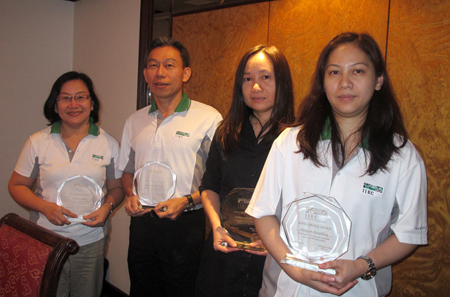
 Long Service Awards Presented to Angelica Dealino, Sommai Phon-amnuaisuk, Long Service Awards Presented to Angelica Dealino, Sommai Phon-amnuaisuk,
Kullakant Chertchutham and Naraporn Khumthieng (left to right) |
| For more information, please visit http://www.iiec.org/index.php/iiec-news/556-iiec-presents-the-long-service-awards-celebrating-more-than-a-decade-of-staff-commitment-to-energy-conservation.html |
|
Back to Top 
|
|
|
|
|
| |
|
About IIEC
The International Institute for Energy Conservation (IIEC) was established in 1984 as a non-governmental (NGO), not-for-profit organization, in order to foster the implementation of energy efficiency in developing countries and countries in transition. IIEC’s mission is to accelerate the global adoption of energy efficiency, transport and environmental policies, technologies and best practices to enable sustainable economic and environmental development. |
| For the past 30 years, IIEC has been providing solutions to the problems posed by the rapid increase of energy demand in developing and industrializing countries. IIEC has an established niche as a provider of novel solutions with the flexibility to work simultaneously with multilateral institutions, governments, academic and research institutes, industry and non-governmental organizations. |
|
 If you do not wish to receive IIEC E-Notes, please reply to e-notes@iiec.org with the word "UNSUBSCRIBE" in the subject line. If you do not wish to receive IIEC E-Notes, please reply to e-notes@iiec.org with the word "UNSUBSCRIBE" in the subject line. |
| |
 |
Partners for Sustainable Energy and Environmental Solutions  |
|
|
 |
| Head Office : |
 |
Asia Regional Office : |
Country Offices : |
|
USA
Tel: +1 703 464 0561
Fax: +1 703 689 4427
e-mail: iiecdc@iiec.org |
Thailand
Tel: +66 2 662 3460-4
Fax: +66 2 261 8615
e-mail: iiecbangkok@iiec.org |
India
Delhi
Tel: +91 11 4182 8216
Mumbai
Tel: +91 22 2592 5215-17
e-mail: iiecindia@iiec.org |
Philippines
Tel: +632 426 8567/426 6001 loc 4833
Fax: +632 426 8566
e-mail: iiecmanila@iiec.org |
|
 |
| Copyright © 2014 International Institute for Energy Conservation, All Rights Reserved. |
|
|
